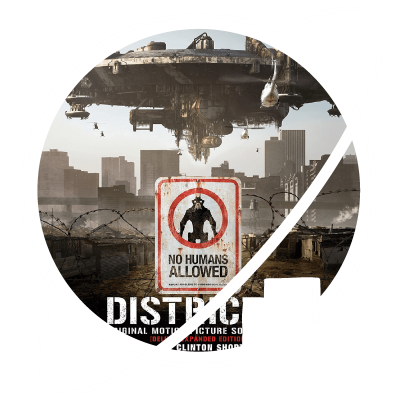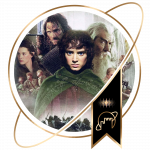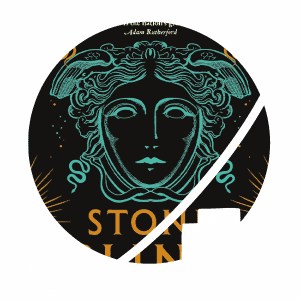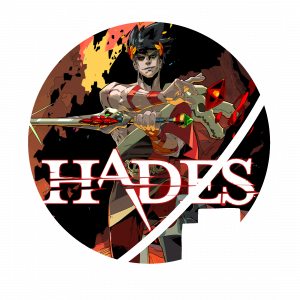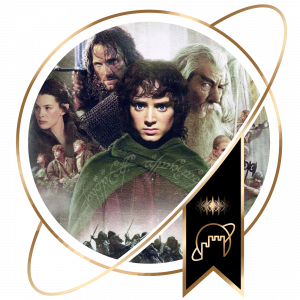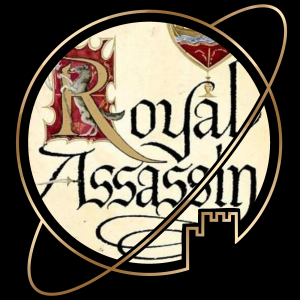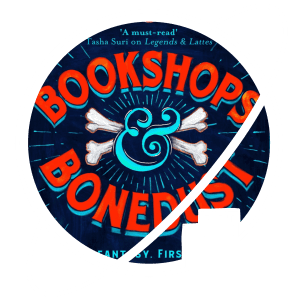Welcome to the Escape Velocity Collection!
We are an opinionated group of friends reviewing all sorts of fantasy and science fiction media. Don’t forget to get to know the curators and visit our curated Collection, where we discuss the stories that never cease to transport us to another world.
Will you escape with us?
LATEST POSTS:
- Movie directed by Neill Blomkamp
- Starring Sharlto Copley, Jason Cope, David James, Vanessa Haywood, mandla Gaduka and others
- Released 2009
- Runtime: 112 minutes
A mothership full of aliens in desperate plight arrives on earth, hovering menacingly but ultimately passively over the city of Johannesburg. Society responds as it always has to the arrival of outsiders: the aliens are excluded and end up packed together in squalor in a slum. After a period of riots and other struggles, Wikus van de Merwe is tasked with leading the private security operation of evicting the aliens and transferring them to a new camp further outside of the city.

I watched Elysium, another of Blomkamp’s movies, a couple of weeks ago. As I wrote then, I thought back to District 9 and I remembered it being better than Elysium. That got me thinking, because apart from the premise, I really I didn’t remember all that much of District 9. So I decided to re-watch it – and honestly, I was a bit disappointed.
The movie has a great premise that flips the script on the usual first contact narrative, with the aliens needing the humans’ help as opposed to presenting an extra-terrestrial threat. The documentary-style cinematography sucks you in, and the first half of the movie seems to set up for a more thoughtful sci-fi drama that focusses on cultural impact and delivers a (perhaps a little heavy handed) critique of apartheid in South Africa and racism in general. But as the plot progresses, the movie (d)evolves into a more predictable sci-fi action flick with blood splattering the camera in long shootouts throughout the city with a multitude of vehicles and weapons. The critique of apartheid and discrimination is undercut by the aliens’ barbarity (and frankly, the depiction of their (lack of) mental faculties) as well as the stereotypical portrayal of the Nigerian gangs in District 9. The documentary style is mostly abandoned to show some more intimate moments, especially with the aliens themselves, but that also starts raising questions on the aliens’ background that are never answered – which now feel more like gaps in worldbuilding than mysteries beyond the documentary makers’ comprehension.
As a result, I feel like there is a very stark divide in style between the first and the second half of the movie that hurts it overall. I am not saying it is not passable as a sci-fi action movie, but if you’re looking for alien shootouts and mech suits throwing cars, that’s locked behind about an hour of set up about how humans mistreat aliens. And if you’re looking for a more thoughtful film that subverts your expectations on first contact and delivers a scathing societal critique, you’re probably better off switching to a different channel about halfway in, lest you be bored by a hail of bullets that lasts about an hour long.
Overall, I especially like the movie’s first half – it stuck with me over the years and I believe it makes District 9 definitely worth watching. But be prepared for a violent (but spectacular) second half that leaves some itches unscratched and loses some of the movie’s potential along the way.

This movie started out very promisingly. It has quite an interesting premise and I was very curious to see where they were going with it. The first half of the movie mainly shows the immense cruelty in how the aliens are dealt with, and the parallels that were clearly drawn with the South African apartheid regime added an interesting layer to this.
However, after this promising beginning it quickly went downhill for me. The movie primarily follows one main character who experiences some very traumatic events. However, since he is shown in the first thirty minutes of the movie as an incredibly cruel and incompetent man, it was very hard for me to care all that much about what was happening to him. From there the movie developed into a standard action movie with a lot of shooting, which is where I lost all of my remaining interest. To be very honest, at some point I even fell asleep and so I missed the end of the movie. I don’t feel I missed anything worth going back for.
Considering the fact that I never really enjoy action movies, I probably could have predicted that this would not be the movie for me. However, the way it started out really did make me think that maybe I would at least somewhat enjoy this one. I am sure there is an audience of people who will love it, but sadly I am not one of them.
Tagged:
Reviewed by:
- Video game developed by Key
- Directed by Jun Maeda
- Art by Itaru Hinoue
- Published by Sekai Project and Visual Arts
- Published in 2004
- Visual novel, Singleplayer
- Playing time: 62 to 129 hours
- Platforms: Android, IOS, Microsoft Windows, PlayStation 3, PlayStation 4, Windows Phone, Xbox 360, PlayStation Vita, Nintendo Switch
This visual novel revolves around high school student and self-proclaimed dissident Tomoya Okazaki, who (due to suffering from several traumas) has given up on making something of his life. This changes, however, when he meets the mysterious girl Nagisa Furukawa at the beginning of the new school year. This encounter is the beginning of several (potential) new friendships, which will change his life forever.

Clannad… How do I describe this game, other than to say that it has a very special place in my heart?
Let’s start this review with the caveat that I believe this game lies on the fringes of what most people would consider ‘fantasy’. Magic realism plays an instrumental role in the story, but both plot and characters are actually very mundane. Mundane as in ‘earthly’ and ‘human’, that is.
On that note – for those who are not familiar with the concept of visual novels – Clannad is more of an interactive novel than a video game with mind-blowing gameplay. Apart from the occasional choice, the story evolves without much of the player’s intervention. To explore all storylines, you’d have to replay the game several times, which includes rereading text that you have previously read, though the game also offers a convenient skip funtion for this.
As Clannad was my first experience with a visual novel, the above things were something I first had to get accustomed to. Though I now appreciate the medium, I can imagine it’s not everyone’s cup of tea.
With all of that out of the way, I want to emphasize Clannad is one of the best character-driven stories I have ever encountered. The writing is exceptionally good, evoking the whole range of human emotions. Some storylines are still haunting my thoughts years after I last played them (I’m looking at you Kotomi).
At first glance, Clannad appears to be a high school romance story, but that would be much too misleading a description. Though romance is necessary to progress some of the storylines, the core themes revolve around finding meaningful connections, as well as family and the accessory complex trapfalls of such relations. At times these themes involve heavy subjects, but the game always manages to balance such moments with light-hearted humor sprinkled in between. Each of these stories is so masterfully crafted, that afterwards I often need a long break from playing, simply to process it all. And each time I return, I’m glad to be reunited with Clannad‘s soft-hearted though complex characters.
Another thing this game definitely excels in, is its soundtrack. I would recognize it everywhere (this is a proven fact; it seems Clannad‘s music has a way of making its way into YouTube videos and real-life television). In combination with the beautiful anime-style art, the music succeeds in delivering an experience unlike any other visual novel I have played since.
I should probably note that Key is a Japanese studio. Clannad takes place in Japan and, as such, the game presents Japanese culture, providing explanations when necessary. The humour and art of Clannad are similar to what you find in anime. If Japanese anime isn’t your cup of tea, Clannad might not work for you.
Should you want to give Clannad a try (and you have no experience with visual novels), I would recommend looking up a spoiler free walkthrough/guide online to see how each characters’ ‘route’ can be achieved. This helps to streamline the playing process,and prevents unnecessary repetition later on.
See also:
LOTTE
Check out our reviews of the media mentioned in this post here:
After a good six years, our Pathfinder campaign has finally come to an end. This means, of course, that it’s time for me to come up with a character for our new campaign. Now I know there’s people who have tons of ideas for characters that they want to play, but I personally found myself drawing a blank.
To help myself – and you! – I compiled a list of ways to come up with a new D&D character. Let’s get to it!
1. Place an existing character in a fantasy setting
One very easy trick to coming up with fun characters to play is to think of characters that already exist. There’s really only so many different types of “unique” characters humanity can come up with, so why not take some inspiration from some characters from popular fiction? You could even just choose a celebrity to “reference”. The key here is to choose someone for whom you can quickly guess how they would respond to a given situation.
Some examples:
- Fantasy Elle Woods from Legally Blonde, going to school for magic to get back a guy, but finding out she’s actually really good at it
- Fantasy Bones from Star Trek, a cleric who’s really just annoyed to be here all of the time, but his friends wanted to go on an adventure so here he is, I guess
2. Mixing fantasy with real life jobs or archetypes
Another way to think of fun characters can be to try to place “real world” people in a fantasy/sci fi setting. I don’t know about you but there’s nothing I love more than the overlap of fantasy and the mundane. You know: like that scene from Shrek where the guards complain that they don’t have dental insurance?
Some examples:
- A yoga girl monk
- A Warlock influencer whose patron is a brand (This is actually an idea I really wanted to use for our campaign, except we unfortunately play Pathfinder, where Warlocks seem to be a fully different thing from what they are in D&D).
3. Go for an unusual race/class combination
There’s some classic race/class combinations, but why not switch it up? If you choose a strange combination, you’re instantly prompted to discover just why this character would have chosen this class.
Some examples:
- Why would a gnome have decided to become a barbarian? Maybe they’re just packing a lot of rage in their itty-bitty body, but perhaps they chose this path to protect their village. Even a village of gnomes needs someone to stand guard, right? Or maybe they grew up reading books about barbarian adventurers and decided to set out and prove that they, too, can learn to rage.
- A dwarven Druid may have spent their whole life living in caves with their family. Not being particularly strong or smart, they didn’t think they were much use to others. When they eventually step out into the outside world, they realise that their special talent was never going to serve them well underground: this dwarf has a special connection with nature. They decide to set out to explore their gift, leaving their familiar caves and rocks behind to venture out into the woods.
4. Go for the classics
There’s really nothing wrong with going for a “classic” D&D character. Those of us who’ve grown up with the Lord of the Rings may recognise finally getting to indulge our childhood desire of being a fancy high elf princess or a halfling rogue in our first D&D game. Besides: everything has already been done before anyway, so you’re never going to be truly original.
Anyone who’s watched an actual play D&D campaign series will likely have worried about being as “good” a player as the cast of Critical Role, or as funny as the cast of Dimension 20. It can be easy to forget that just like you shouldn’t compare yourself to professional artists or Olympic figure skaters (I genuinely did think I was gonna be a phenomenal skater right away – turns out skating’s really hard actually, lol), you shouldn’t be comparing yourself to professional improvisers playing D&D.
So don’t think you need to be hilarious or even original, especially if you consider the fact that no one will watch you play except your friends.
Some examples:
- A Fancy magical lady elf
- A Brooding rogue
- Literally just Merry and/or Pippin from the Lord of the Rings
I hope this helps you with creating characters for your future campaigns! Meanwhile I’ll be back here, brainstorming…
Wish me luck!
Time to get to know the Escape Velocity Collection’s curators! How? By asking them the questions that really matter! Let’s see what our curators have to say…
This week’s question is:
What is the last piece of media you didn't finish, and why?
The last book I didn’t finish was The Left Hand of Darkness by Ursula le Guin, though I would like to tell myself that I’ll pick it back up and finish it sometime later. It was disappointing because I went into it with high expectations. I think that the main reason I didn’t finish was the fact that the audiobook I was listening too was a bit mumbly and made the whole thing sound like just another day at the office. Maybe I should read this one on paper instead.
(Dis?)honourable mention to the The Witcher TV-series, which I watched a couple of episodes of – but I felt it was a bit hit and miss in the storytelling and costuming, and I hadn’t read the books anyway so I decided to put it off too.
I believe that would be Netflix’s Kiss Me First. While watching the trailer, I was drawn to what seemed to be a fascinating thriller centred around queer characters and a VR simulation game. After a few episodes, though, the plot seemed little more than a lacklustre horror plot, in which flat characters get killed off one by one by a ‘mysterious’ murderer.
As for the queer characters: mostly queerbaiting. Though I shall admit that the two female leads were convincing in their acting, the writing was just poor. Jasmijn and I stopped watching after four episodes, around the time the climax was starting to pick up. It wasn’t enough to keep us engaged…
I recently started listening to The Tropic of Serpents by Marie Brennan, which I ended up not finishing. It is one of my sister’s all time favourite fantasy series, so I was really hoping to like it. I read the first book in the series a year or two ago, and while I did not hate it I did not really love it either. Although it is well-written, I just found I did not connect well enough with any of the characters in order to be truly invested in the story. I was hoping that this would maybe change with the second book in the series, but when this did not happen after a couple of hours I decided to put it down for good.
DUNE. The only reason I started this book was because Peter absolutely adores it. However, I could not get through it at all! I think this was mainly because the book is about sand and politics and not about people. It was also just So Many Words. See also our review on Dune.
My dad always gives me a book for my birthday and on Christmas. Sometimes it takes me a while to get around to them, but I do always read them. A year or so ago, he gave me The Left Hand of Darkness by Ursula le Guin. I started it a couple of months ago, but I just could not compel myself to finish it. I think the main problem lies with the style of sci-fi of the book. It has lots of weird names and places that I find difficult to keep track of. At the end of the day, I read for fun. This means that if a book is hard to get through, it’s likely just not for me. I’ll probably finish it eventually, but I’m not, like, looking forward to it.
[Peter: Poor Ursula, she is under heavy fire today! Maybe I can borrow the paper version in the meantime so I can give it another shot first?]
I almost never not finish a TV-series or book I started. I get disillusioned, frustrated, angry, but I do want to know how it ends. And maybe I am just a little bit completionist. Not long ago I stood on the brink of quitting the audio drama Earth Eclipsed, but I persevered.
The last thing I definitely remember quitting was the TV-series Once Upon A Time. I really liked the first season, the second season was all right, but then the third season came along and it got so horribly boring. It took ages to get through the Peter Pan-storyline, but, I hoped, it would work up to something, it would get better. It did not. The semi-Witch of the West was terrible. And when off-brand Elsa appeared, I was out.
That’s it: another soul-searching question answered!
Still curious? Visit each curator’s page to see what they’ve recently been up to!
Check out our reviews of the media discussed in this post here::
April 16, 2022

Collected on: April 16, 2022
- Book written by Tonke Dragt
- Published in 1962
On the night before he will receive his knighthood, the young squire Tiuri leaves the chapel of his nightly vigil to answer the call of a stranger asking for help from the dark outside. What initially seems a simple task ends up leading him in a dangerous quest across mountains and kingdoms with pusuers on his tale every step of the way.
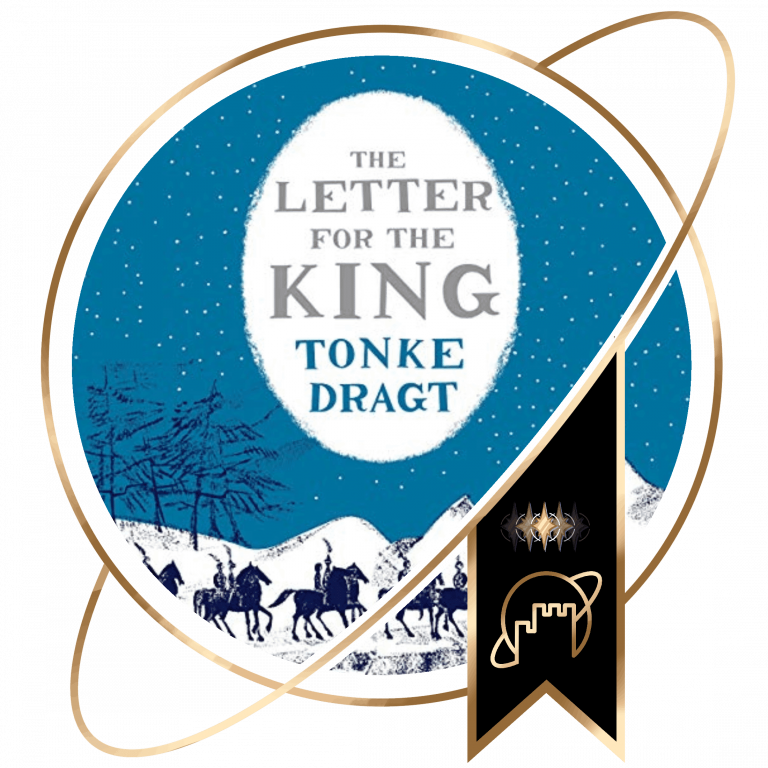
Welcome to this in-depth, spoiler-free discussion of Letter for the King (Brief voor de Koning) by Tonke Dragt, the masterpiece of Dutch children’s fantasy fiction (and not, mind you, the awful Netflix series), which our curators Peter and Jasmijn are adding to the Escape Velocity Collection, a series of items that we believe represent the absolute peak of what the speculative genre has to offer.
It turns out we don’t have any curator who doesn’t absolutely adore Letter for the King, so we’re deviating from our format a little bit (we couldn’t find anyone critical enough), so instead, Jasmijn (who’s a primary educator) and Peter (who’s a stuffy old lawyer) are going to talk about why this is a great book for both children and adults! So in short, we’re going to add Letter for the King to the collection together – and tell you why the next thing you should read is the Tonke Dragt’s magnum opus.
So, to start off – when did you first read Letter for the King and what did it do to you?
I love this question, because Letter for the King has won a special place in my heart at a relatively young age. When I was nine this book was the very first big chapter book I read. It was, for me, the gateway to the magic of real stories. I was completely sucked into the story and the adventure of main character Tiuri. After that, I was never to be found without a book.
How about you? How did you get introduced to this timeless classic?
I’m honestly not entirely sure, but given that I read The Lord of the Rings by the time I was nine (I know, why???), it must’ve been at least a couple of years before that. I remember my dad reading the first chapter about Tiuri’s nightly vigil on the cold stone floor of the chapel and falling in love instantly with this story that epitomised everything that I felt a medieval story ought to have. I already loved visiting castles and old towns with my parents, I owned a plastic sword and my mam embroidered a dragon on a surcoat for me. But when my dad started reading The Letter for the King, there really was no turning back: that was the moment my parents doomed me, the first action in a chain of events that eventually led to me becoming a fantasy nerd who writes reviews of fantasy books for a hobby and does HEMA (historical fencing) for a sport. Tonke Dragt started it all!
Let’s dive in her world and see what that magical book is all about.
Worldbuilding
There’s no two ways about it, the world of Letter for the King is not particularly original. The story takes place over two medieval European Kingdoms, one with a slightly more north-western European feel, one with a slightly more southern European feel (though some of that distinction may be my imagination). Perhaps the most interesting element is that the characters appear to be Christians, though it doesn’t play a significant role in the story.
At the same time though, I found re-reading the book to be surprisingly refreshing. Sometimes, it feels like the trend in modern fantasy is to go for a dark, more ‘realistic’ world full of long history, complex politics, intriguing magic systems, violence, and a very steep learning curve. Letter for the King is the antithesis of all that. It presents an unabashedly simple noblebright world of knights and squires, damsels and castles. Even bandit chieftains have honour. A single betrayal in a duel can spark the plot of two whole books.
If all the fantasy in the world were like this, it would get boring. But as it stands, Letter for the King is an amazing palette cleanser.
For a child who has never read a fantasy book, though…
I feel like you are almost touching upon an excellent point here. As media-devouring adults, we quickly look down upon classic stories, calling them clichés and such. But when you are young, every new genre is a completely new concept. This is why well-written classics like Letter for the King are important. They are the backdrop for our future story-adventures. The way in which Tonke Dragt has written this knight’s tale is elegant and quick-paced. The story is exciting, especially when you are younger, because you don’t know yet about fantasy tropes.
Also, I have to add that I would have never even considered this book to be eligible for the fantasy genre. Which is probably why it is a perfect gateway to books that are more high-fantasy. The medieval setting creates a familiar starting point since even young children have some basic knowledge of the world of knights and castles. Which is definitely not always the case when we move into the sci-fi realm.
Characters
This book is considered a great read for twelve-year olds. However, one of the reasons it is still a comfortable read for adults is the ways in which our main characters is usually not an idiot. I have read/watched my fair share of children’s media, and ‘teenagers making stupid choices’ is something that can get on my nerves quite quickly (looking at you, Shannara chronicles). Tiuri doesn’t always make the right choice, but he does seem to understand the urgency of his task.
I agree, I love that Tiuri is allowed to make mistakes – and has to persevere through some hardships – without adversity becoming the core of his character.
My own favoured character is Sir Ristridin of the South, whom I like to call ‘’the Dutch Aragorn”, the noble and wise questing knight with his silver horn, wandering the land looking for vengeance and adventure. Ristridin is a classic character played straight (he would not look out of place at King Arthur’s court at Camelot), but one which drew me in and inspired me like no other when I read about him as a kid. Perhaps it is because the book is a little bit older, but I love that Dragt felt at liberty to just write a character that is the pinnacle of the knightly ideal in a kid’s mind, with no caveats or subverted expectations. It is great for kids but even as an adult, it just fills your heart with joy and, for me, a certain nostalgia to simpler stories, where the good guys were good and the bad guys bad.
Age
A I said, Letter for the King is a bit on the older side: it was published in 1962. Obviously, the book’s age is not going to play as much of a part for more grown up readers as it will for children, and I think that apart from an odd choice of word here or there, there is very little holding it back for modern readers (besides, that shouldn’t be a problem if you’re reading in translation). There’s the odd christianity reference that seems a bit out of place in modern fantasy, but they are few and far between – and I think they fit well with the world that is relatively closely based on medieval Europe. So the real question is – do you think that also goes for today’s children?
Of course, this book will not be a good fit for all children, in the same way adults have their preferences in literature. It is most definitely not considered an easy read for kids. In general, I would recommend the book to readers age 12 and up. Since the story is set in medieval times, it seems like kids accept the archaic language more easily. But the book was written with the younger audience in mind. Language that is specific for the medieval setting, is usually explained in the context of the story. As a primary school teacher, one of my goals is to find ways to bring new and fitting books to the attention of my pupils. Re-reading this book I was surprised by the bite-sized chapters, which makes it a perfect read-aloud. The biggest tell this book is old? All cool main characters are male: maybe when reading to your kids genderbend a character, or two.
Conclusion
Whether you are looking for a gift for yourself or for someone else, a story for fantasy newbies or sci-fi nerds, or a book to read out loud in your classroom: you have found it. Letter for the King is most definitely a classic for a broad target audience. Translated in more than 30 languages, you might even be able to find it in your mothertongue, or in a language you are learning. Just don’t watch the series (you can find our review on that HERE).
- Book written by Tonke Dragt
- Published in 1962
On the night before he will receive his knighthood, the young squire Tiuri leaves the chapel of his nightly vigil to answer the call of a stranger asking for help from the dark outside. What initially seems a simple task ends up leading him in a dangerous quest across mountains and kingdoms with pusuers on his tail every step of the way.

This book is the very first lengthy story I read as a child, which gives it a special place in my heart. Whilst children of today deserve contemporary stories, there are some classics everyone should have read when they were young. This book, filled with adventure and suspense definitely falls in that category. But even nowadays, when rereading it, the story holds up. What surprised me, was the quick pace and the short chapters, which makes it a perfect book to read aloud. The biggest tell that it is a book written in the sixties? All the protagonists are boys. Nevertheless, this is a knight’s tale fit for all genders and all ages.

The Letter for the King is the best Dutch fantasy book ever written. The only other contender for the top spot is The Secrets of the Wild Wood, the second part in the duology (and maybe The Goldsmith and the Master Thief, also by Tonke Dragt). You’re welcome to try to fight me on this.
The Letter for the King is a children’s book, yes. But I would argue that even as a grown up, it is an amazing read.
The reason is that The Letter for the King is so wonderfully refreshing. It is an honest-to-God noblebright world in which characters can be genuinely shocked if an oath is broken, in which knights – on either side – behave with dignity and honour, in which bandits back off in the face of true conviction. The plot is full of suspense but never overly complex. Tiuri’s story is not all about fighting, but also about being clever and being kind at the right times.
The Letter for the King is worth reading as an adult because it will transport you to a different world same as any other fantasy book might, but in an utterly comfortable way. Allow yourself to be that kid swinging sticks in the woods again, or going to that castle with your parents and seeing the actors joust. The Letter for the King will bring you back there.
You can find my discussion with Jasmijn on why The Letter for the King ought to be a centrepiece in your collection here.
Tagged:
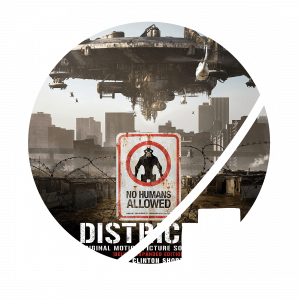
Review: District 9 – Neill Blomkamp
A mothership full of aliens in desperate plight arrives on earth, and society responds as it always has to the arrival of outsiders: the aliens end up in a slum on the edges of Johannesburg..

Review: Clannad – Key
Review of the video game Clannad.
Tomoya Okazaki has given up on making something of his life. This changes, however, when he meets the mysterious girl Nagisa Furukawa.

How to brainstorm for your new D&D character
Need help coming up with a D&D character? Lotte’s got you covered! She has four tips to get you started.

Curator Question: What is the last piece of media you didn’t finish, and why?
Our curators discuss the latest pieces of media they didn’t finish, as well as the reason they didn’t.

Collected: Letter for the King by Tonke Dragt
COLLECTION: On the night before he will receive his knighthood, the young squire Tiuri leaves the chapel of his nightly vigil to answer the call of a stranger asking for help from the dark outside…

Review: Letter for the King – Tonke Dragt
On the night before he will receive his knighthood, the young squire Tiuri leaves the chapel of his nightly vigil to answer the call of a stranger asking for help from the dark outside…








